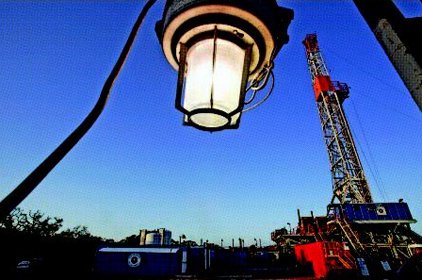LITTLE ROCK — Many Arkansans can expect lower heating bills this winter, thanks to enormous levels of natural gas stored across the country.
The state's largest natural gas provider, Center-Point Energy, expects the average monthly heating bill to drop 20 percent to 25 percent, from about $129 last year to about $101 this winter, said Alicia Dixon, a CenterPoint spokesman. CenterPoint has about 430,000 customers in Arkansas.
"If there is a silver lining in this economy, this is good news for consumers," she said.
In Arkansas, the average CenterPoint customer was billed $129.34 last year for using about 90 ccf (hundred cubic feet) of natural gas. Based on current gas prices, that would fall to $101.07 this year, Dixon said. CenterPoint won't file its official projections for winter gas prices until late next month.
The country already has a record level of natural gas stored for this time of year,said James Williams, an energy economist who owns WTRG Economics near Russellville. There are about 3.5 trillion cubic feet in storage, compared with about 2.9 trillion cubic feet last year, Williams said. The five-year average is a little less than 3 trillion cubic feet.
"Right now, we're on track to have the highest level of gas in storage in history," Williams said. "We're just swimming in the stuff. Natural gas prices for the last month or two have been low enough that utilities in some areas are burning it [to produce electricity] instead of coal."
Natural gas for October delivery gained 32 cents Friday on the New York Mercantile Exchange to close at $3.78 per million British thermal units (expressed in the industry as MMBtu). The price spiked 28 percent for the week amid signs of economic recovery but still is only about onethird of what it was last year and analysts don't expect it to keep climbing.
The price of natural gas probably will be about $3.25 per MMBtu this winter on the Nymex, compared with about $7.50 last year, Williams said.
"That doesn't mean the consumer will pay half as much [as last year]," Williams said. "The consumer also is paying charges for transportation, metering and so on. But you're definitely looking at lower gas prices."
Fuel charges make up about 70 percent of the total on a monthly gas bill. The remainder covers maintenance, operations and profit for the utility and its investors. The price of the gas itself is passed directly to ratepayers without the utilities taking a profit, with the state Public Service Commission monitoring the numbers.
Part of the reason for the higher amount of stored gas is drilling in Arkansas' Fayetteville Shale and other natural gas formations such as the Marcellus Shale in the Appalachian Basin and the Haynesville Shale in Louisiana, Williams said.
Because the industry in recent years acquired the ability to extract gas from shale by fracturing the rock deep beneath the earth's surface, an excess of natural gas now is being tapped. So natural gas isstored in the spring and summer to prepare for winter demand, Williams said.
Another factor is lower demand for gas because of the recession, said Dixon, the CenterPoint Energy spokesman. "Industrial demand has declined and even residential demand has declined," she said. "People are conserving energy."
The U.S. Energy Information Administration projects that total natural gas consumption will likely decline by 2.4 percent in 2009 and remain flat in 2010.
Williams said the amount of gas in storage is so high that even if a hurricane hits the United States, it likely wouldn't affect gas prices significantly.
Arkansas Oklahoma Gas also will charge customers less for natural gas this winter, but it is uncertain how much less it will be, said Mike Callan, president of Arkansas Oklahoma Gas, which is based in Fort Smith. Arkansas Oklahoma Gas also files its winter rates with the Arkansas Public Service Commission in late October.
"Natural gas prices are so volatile," Callan said. The cost to consumers could change dramatically one direction or the other depending on what natural gas prices do between now and the end of October, he added.
It wasn't at all apparent last year that natural gas prices would dip as low as they are now. In the summer of2008, natural gas prices were almost $13 per MMBtu. That was more than double the price of $5.50 per MMBtu in September 2007, reflecting a spike similar to what drivers saw at gasoline pumps during the period.
Last year, energy experts were saying that the longterm trend for energy prices would remain high. At the time, gasoline was above $3 a gallon and oil was well above $100 a barrel. Now regular gasoline in Arkansas is averaging about $2.34 per gallon, according to AAA, and oil is going for about $70 a barrel.
A big percentage of the price of oil last year was based on speculation, said Terry Clower, director of the Center for Economic Development and Research at the University of North Texas.
"It was demand [for oil] coming from investors who never had an intention of taking delivery of 10,000 barrels of oil," Clower said. "Oil was a hedge against the falling U.S. dollar and falling stock prices."
The Arkansas Public Service Commission will release information on expected heating rates in the next several weeks, said John Bethel, executive director of the commission.
"We do that each year trying to give a best estimate of what prices should look like," Bethel said.
"Then we'll know with more certainty at the end of October when the gas utilities make their winter gas filings. Right now, the general price level is certainly lower than it was this time last year."
Business, Pages 75, 76 on 09/20/2009

